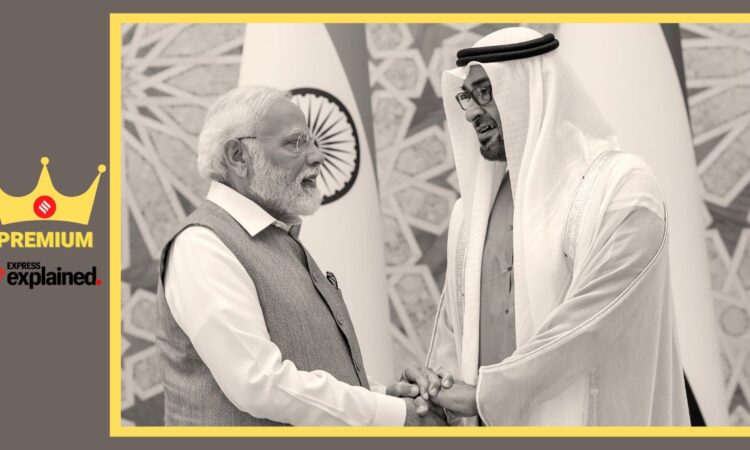How India and UAE are planning to promote use of local currencies for cross-border transactions | Explained News

India and the United Arab Emirates (UAE) have signed a pact to establish a framework to promote the use of the rupee and UAE Dirham (AED) for cross-border transactions.
“The MoU on establishing a framework for the use of local currencies for transactions between India and the UAE, aims to put in place a Local Currency Settlement System to promote the use of INR (Indian rupee) and AED (UAE Dirham) bilaterally,” the RBI said in a statement on July 15. “The MoU covers all current account transactions and permitted capital account transactions,” the Indian central bank added. The deal was signed during Prime Minister Narendra Modi’s visit to Abu Dhabi Saturday.
The mechanism
The framework for the use of local currencies for transactions between India and the UAE aims to put in place a Local Currency Settlement System (LCSS). The creation of the LCSS would enable exporters and importers to invoice and pay in their respective domestic currencies, which in turn would enable the development of an INR-AED foreign exchange market, according to the RBI. This arrangement would also promote investments and remittances between the two countries. The use of local currencies would optimise transaction costs and settlement time for transactions, including for remittances from Indians residing in UAE.
New Delhi is likely to use this mechanism to pay for crude oil as well as other imports from the UAE, which is currently made in US dollars. India is the third largest oil importer in the world and the UAE was its fourth biggest supplier of crude last year. The RBI had last year announced a framework for settling global trade in rupees, primarily targeting trade with Russia. But this is yet to take off in a substantive manner.

Impact of the move
Bilateral trade between India and the UAE was around $85 billion in FY23. Government officials indicated that New Delhi is looking to work out a way to hedge exchange rate risks in the rupee-based trade to limit losses for Indian exporters.
The move to ink the pact with the UAE is part of a concerted policy effort by India to internationalise the rupee to bring down the dollar demand as a means to insulate the domestic economy from global shocks. Government officials had earlier indicated that apart from Russia, countries in Africa, the Gulf region, Sri Lanka and Bangladesh had also expressed interest in trading in rupee terms.
The RBI’s plan to settle international trade in the local currency will let importers make payments in the rupee, which will be credited to the special account of the correspondent bank of the partner country, while exporters will be paid from the balances in the designated special account. The Central bank is also in the process of issuing a Standard Operating Procedure to all banks so that e-BRC (electronic bank realisation certificate) becomes easy to use.
First uploaded on: 15-07-2023 at 20:33 IST






